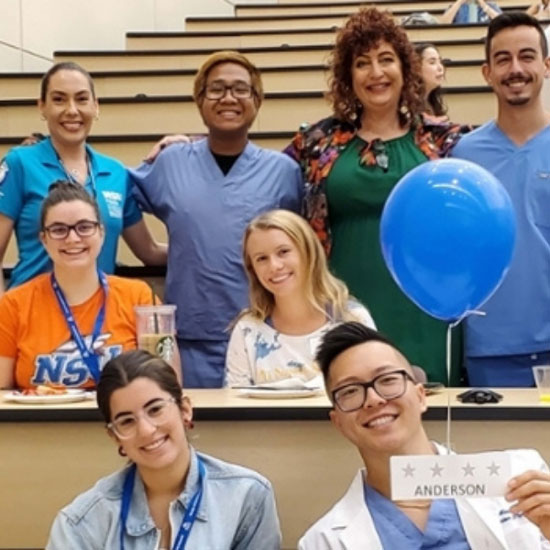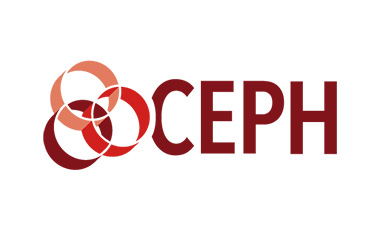Fuel Health Transformation: Your Journey to Make a Difference
Meet the demand for public health leadership with a master's degree from Nova Southeastern University’s College of Osteopathic Medicine. You'll gain a deep understanding of all aspects of public health, including biological, social, environmental, demographic, and political; all with an emphasis on multicultural and underserved populations. Graduate with the tools and expertise to enter work in a setting that matters most to you.
Unlock Your Potential, Anywhere: Embrace Limitless Learning
With our on-site evening classes and online course options, you have the flexibility to schedule your studies around your daily schedule and adjust when, where, and how you take courses to fit your needs. The curriculum between on-site and online is fundamentally the same and is often taught by the same faculty member.

Hands-on practical applications, interactive classes, interesting electives...my only wish is that I started my NSU degree earlier, so I had these insights sooner in my career.
Isa Prude | M.P.H./O.D, '24
Quick Facts
Open Advising
Every Monday from 1:30 pm - 3:30 pm EST
Join Zoom Meeting
Potential Career Paths
Why Earn Your M.P.H. at NSU?
Flexible Course Load
Complete your classwork while maintaining commitments like career and family with on-site and online evening classes.
Hands-On Electives
Get direct exposure to research and community projects in mental health, genetics, oral health, health disparities, global health, and more.
Sought-After Skills for Health Care
Choose to master a variety of disciplines. This course of study is an ideal complement to other health profession degrees.
Comprehensive Accreditation
See Where a Master of Public Health Degree
Can Take You

Get the NSU Edge
Don’t just be another fish in the school. Be a Shark. That’s the NSU Edge. And as a student in the Master of Public Health Program, you’ll:
- Discover how public health education complements all health professions degrees.
- Become a leader of public health programs and services.
- Benefit from professional diversity of faculty members and students.
- Enjoy flexible online or on-site public health courses.
- Experience a fully accredited Master of Public Health program.
Earning Potential
M.P.H. Curriculum
Through a combination of core courses and electives, the M.P.H. curriculum includes comprehensive teachings about public health as well as unique opportunities to explore tracks like global health, communications, substance abuse, and more.
Core Competencies
The core competencies of NSU’s M.P.H. program align directly with the program’s mission to improve the health of the population through education, research, and service, with an emphasis on multicultural and underserved populations.
Profession and Science of Public Health
- Explain public health history, philosophy, and values.
- Identify the core functions of public health and the 10 Essential Services.
- Explain the role of quantitative and qualitative methods and sciences in describing and assessing a population’s health.
- List major causes and trends of morbidity and mortality in the United States or another community relevant to the school or program.
- Discuss the science of primary, secondary, and tertiary prevention in population health, including health promotion, screening, etc.
- Explain the critical importance of evidence in advancing public health knowledge.
Factors Related to Human Health
- Explain effects of environmental factors on a population’s health.
- Explain biological and genetic factors that affect a population’s health.
- Explain behavioral and psychological factors that affect a population’s health.
- Explain the social, political, and economic determinants of health and how they contribute to population health and health inequities.
- Explain how globalization affects global burdens of disease.
- Explain an ecological perspective on the connections among human health, animal health, and ecosystem health (e.g., One Health).
Evidence-Based Approaches to Public Health
- Apply epidemiological methods to the breadth of settings and situations in public health practice.
- Select quantitative and qualitative data collection methods appropriate for a given public health context.
- Analyze quantitative and qualitative data using biostatistics, informatics, and computer-based programming and software, as appropriate.
- Interpret results of data analysis for public health research, policy, or practice.
Public Health and Health Care Systems
- Compare the organization, structure, and function of health care, public health, and regulatory systems across national and international settings.
- Discuss the means by which structural bias, social inequities, and racism undermine health and create challenges to achieving health equity at organizational, community, and societal levels.
Planning and Management to Promote Health
- Assess population needs, assets, and capacities that affect communities’ health.
- Apply awareness of cultural values and practices to the design or implementation of public health policies or programs.
- Design a population-based policy, program, project, or intervention.
- Explain basic principles and tools of budget and resource management.
- Select methods to evaluate public health programs.
Policy in Public Health
- Discuss multiple dimensions of the policy-making process, including the roles of ethics and evidence.
- Propose strategies to identify stakeholders and build coalitions and partnerships for influencing public health outcomes.
- Advocate for political, social, or economic policies and programs that will improve health in diverse populations.
- Evaluate policies for their impact on public health and health equity.
Leadership
- Apply principles of leadership, governance, and management, which include creating a vision, empowering others, fostering collaboration, and guiding decision-making.
- Apply negotiation and mediation skills to address organizational or community challenges.
Communication
- Select communication strategies for different audiences and sectors.
- Communicate audience-appropriate public health content, both in writing and through oral presentation.
- Describe the importance of cultural competence in communicating public health content.
Interprofessional Practice
- Perform effectively on interprofessional teams.
Systems Thinking
- Apply systems thinking tools to a public health issue.
- Use of technology to promote, investigate and understand relevant public health issues.
- Discuss the political determinants of health in terms of the political structures, relationships, resources, and powers influencing the politics and policies that produce the social determinants of health and resultant health inequities.
- Apply theories of public health practice and research with vulnerable populations.
- Critically review the scientific evidence behind health practices or intervention.
- Design a health program to promote the health and well-being of a vulnerable population using the best available peer-reviewed evidence.
Explore Public Health as a Non-Degree Seeking Student

If you’d like to take a few courses for exploration, professional development, or prep for another track, you can enroll as a non-degree seeking student and take up to four courses (12 credits). You must still apply, send in your transcripts, and pay the application fee.
If you decide later to pursue the M.P.H. degree, you will need to submit a new application. Your previous application does not guarantee acceptance into the M.P.H. degree-seeking program.
Graduate students from other NSU programs who elect to take public health courses may do so with written approval of the public health program director.
After Applying, What Happens Next?
Depending on the time of year, the review process may take a few weeks. You can check your application status at any time via the online application portal. Once a decision has been made, notification is sent via email to the address on file.



